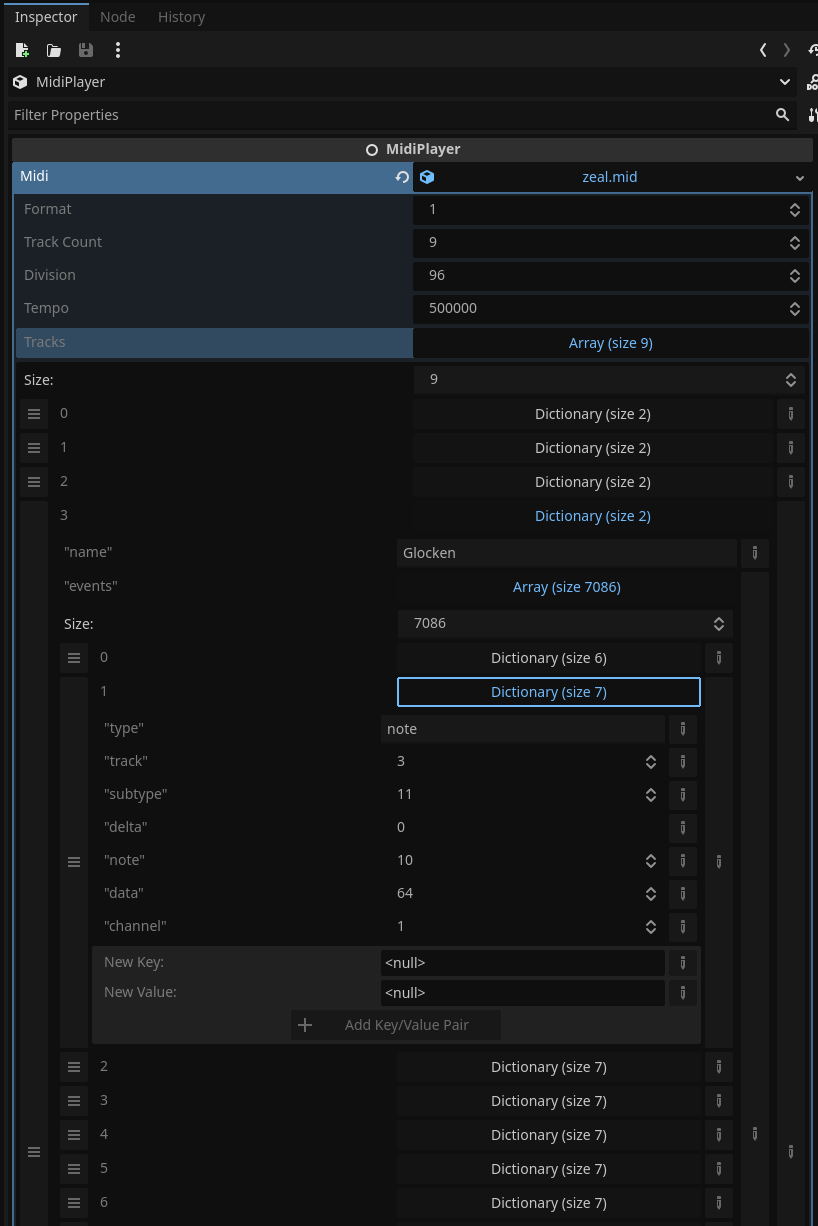
Publisher
nlaha
Godot Midi
This add-on allows for the import and playback of MIDI files in Godot. Great for syncing events to music, making rhythm games, or even your own audio production/synthesis applications. Features: - Easy import of MIDI files as Godot Resources - Easy MIDI event handling with signals - Imported MIDI events stored in an array of dictionaries per-track - Asynchronous playback via a separate thread - Linking to one or more AudioStreamPlayers for synchronization with music Please note: this is a wor...
This plugin has been mirrored from the Godot Asset Library.
The plugin author is in no way affiliated with Gadget.
If you are the author of this plugin and would like this mirror removed, please contact support@gadgetgodot.com.
Overview
This plugin aims to make rhythm game development and music syncing easier than ever before. Import a midi file like you would any other Godot asset, this can then be paired with a "MidiPlayer" node that sends out signals every time a midi event is fired. This project is a work in progress and lacks some features, so feel free to contribute any code or ideas on the pull requests page.
https://github.com/nlaha/godot-midi/assets/10292944/f88acfac-1ff3-49ee-8d25-9ee0ee585d09
https://github.com/nlaha/godot-midi/assets/10292944/543646ec-ed45-406b-a3e5-f2b26caabfbe
Compatibility
This GDExtension addon is compatible with Godot version 4.2.2 and higher. Earlier 4.x versions may work, however they are not officially supported.
Platforms
This extension is compatible with Windows, Mac and Linux. Support for Android is also availble but is not yet integrated into the CI pipelines. For more information on how to compile for Android, see this pull request: https://github.com/nlaha/godot-midi/pull/35
Installation from binaries
Download the latest release from https://github.com/nlaha/godot-midi/releases
If you'd like to download a newer version that hasn't been released, download it from the latest Github Actions run: https://github.com/nlaha/godot-midi/actions/workflows/builds.yml
Copy the
godot-midifolder to your project'saddonsfolderEnable the addon in Godot's project settings
Building from source
Clone the repository with
git clone --recursive https://github.com/nlaha/godot-midi.gitMake sure you have SCons installed
Run
cd godot-cppandscons target=template_debugorscons target=template_releaseto build godot-cppRun
scons target=template_debugorscons target=template_releasein the root directory to build the extensionCopy the
game/addons/godot_midifolder to your project's addons folderEnable the plugin in the Godot project settings menu
Usage
- Import a midi file by adding it to your project folder
NOTE: If you run into import errors or problems with a midi file you downloaded from the internet, it's likely there is a midi event or format that isn't supported by Godot Midi. The best way to fix this is to import the midi file into a DAW (digital audio workstation) or similar software and re-export it. This should convert the midi file into a format easily readable by Godot Midi. I do all my testing with FL Studio so I'd recommend that, you can use the free demo version if you don't have a license.
- Add a "MidiPlayer" node to your scene
- Set the midi resource you want the MidiPlayer to play
Connect to the "note" signal in a GDScript
func _ready(): midi_player.note.connect(my_note_callback) midi_player.play() func my_note_callback(event, track): if (event['subtype'] == MIDI_MESSAGE_NOTE_ON): # note on # do something on note on elif (event['subtype'] == MIDI_MESSAGE_NOTE_OFF): # note off # do something on note off print("[Track: " + str(track) + "] Note played: " + str(event['note']))
Syncing with Music (AudioStreamPlayer)
Because the game thread frame time can fluctuate depending on the system load, GodotMidi's player is run on a separate thread. Because of this, it's best to use the built-in synchronization feature if you want to sync MIDI events to music.
The good news: it's easy to use! Just call link_audio_stream_player(...) with your ASP and it will automatically start/stop/pause the ASP for you!
func _ready():
midi_player.loop = true
midi_player.note.connect(my_note_callback)
# link the AudioStreamPlayer in your scene
# that contains the music associated with the midi
# NOTE: this must be an array, you can link multiple ASPs or one as
# shown below and they will all sync with playback of the MIDI
midi_player.link_audio_stream_player([asp])
# this will also start the audio stream player (music)
midi_player.play()
func my_note_callback(event, track):
if (event['subtype'] == MIDI_MESSAGE_NOTE_ON): # note on
# do something on note on
elif (event['subtype'] == MIDI_MESSAGE_NOTE_OFF): # note off
# do something on note off
print("[Track: " + str(track) + "] Note played: " + str(event['note']))
Open the demo project for an included music visualizer script!
Importing MIDI files at runtime
A similar approach to how the plugin imports MIDI files in the editor can also be used to import them at runtime. Create a MidiResource manually, and call the load_midi method with a path to the source MIDI file.
https://github.com/nlaha/godot-midi/blob/a7d40af0083c8e314b6de619126f87f199d6b661/game/addons/godot_midi/midi_import_plugin.gd#L52-L55